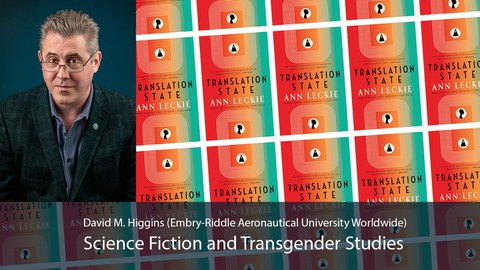04.06.2024
Science Fiction and Transgender Studies | On-Site Guest Lecture by David M. Higgins | July 2nd
SCIENCE FICTION AND TRANSGENDER STUDIES
DATE: Tuesday, July 2, 16:40-18:10
VENUE: WS48/004/U (Wiener Straße 48)
On July 2, the eminent international scholar David M. Higgins whose work on alt-right victimhood as well as transgender studies are crucial interventions in their respective fields will be giving on-site guest lecture and Q&A as part of Julia Gatermann’s seminar “Rewriting the History of the Future: Key Concepts in Contemporary Critical Discourse” as well as the American Studies colloquium – the event is open to all interested colleagues and students. Last, year, Prof. Higgins greatly honored us by giving a key note lecture at our international conference Disruptive Imaginations at TU Dresden on Alt History and Reactionary Worldbuilding, and is now returning Dresden for a guest lecture on "Science Fiction and Transgender Studies" on Tuesday, July 2nd, at 16:40 - 18:10 in Wiener Straße 48, Room 004.
David M. Higgins is associate professor of English and chair of the department of Humanities and Communication at Embry-Riddle Aeronautical University Worldwide, and he is a senior editor for the Los Angeles Review of Books. His much acclaimed monograph Reverse Colonization: Science Fiction, Imperial Fantasy, and Alt-Victimhood has won the 2021 Science Fiction Research Association Book Award, and he has also published a critical monograph examining Ann Leckie’s SF masterwork Ancillary Justice; his research has been published in journals such as American Literature, Science Fiction Studies, Paradoxa, and Extrapolation. In the public sphere, David has been a featured speaker on NPR’s radio show On Point, and his literary journalism has been published in the Los Angeles Review of Books and The Guardian.
Science Fiction and Transgender Studies
In her 1976 preface to The Left Hand of Darkness (originally published in 1969), Ursula K. Le Guin describes science fiction as a “thought experiment” that approaches the present from an unfamiliar vantage rather than as a genre that anticipates fantastical futures: “science fiction is not predictive,” she argues, “it is descriptive.” Science fiction, to put this another way, often engages in what Darko Suvin refers to as a practice of “cognitive estrangement” that enables authors to describe familiar things in unusual ways; it can thus critically defamiliarize things we often take for granted about our contemporary world (Suvin 2017, 116).
In the early decades of the twenty-first century, Ann Leckie carries forward Le Guin’s speculative thought experiment in vital and important ways. The fifth novel in Leckie’s Imperial Radch series, Translation State (2023) expands, clarifies, and sharpens Leckie’s argument that misgendering others – refusing to honor their pronouns and their gender identities – is always an act of violence. The novel drives home how Radchaii characters who disregard others’ pronouns embody what Maria Lugones (drawing on Anibal Quijano) calls “the coloniality of gender,” or the way that imperial societies impose their own gender norms on other cultures in the service of hierarchical domination (Lugones 2008).
Translation State thus offers a striking example of the kind of speculative critical theory Suvin, Carl Freedman, and others gesture toward: it engages in a descriptive thought experiment, situated between transgender studies and science fiction studies (and complementing both), that starkly illuminates the operations of what Dean Spade refers to as “administrative violence,” or the ways that gender identity is imposed, policed, and enforced by various legal mechanisms that enact and sustain social and political norms (Spade 2015). The novel further explores how colonial and imperial power often inescapably shape social categories and slant the politics of recognition in favor of privileged subjects. Leckie thus particularly exposes how the categorical opposition between “human” and “nonhuman” always carries the difficult baggage of Western modernity since the Enlightenment, with its relentless focus on cisgendered white masculinity as a universal norm.
This event is hosted by the Chair for North American Literature with a Focus on Future Studies.

